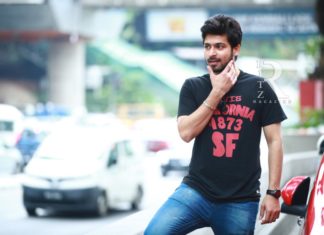His mind never interprets what he sees in simple black and white. His pictures do not convey messages; they ask questions. For photo artist Shibu Arakkal life is all about being unpredictable and mercurial. His award – the Lorenzo il Magnifico gold prize in digital art at the prestigious Florence Biennale 2013, is a culmination of his hard work and garrulous vision – a journey that he began at 18 and has culminated with this prestigious reward 19 years hence.
[wzslider height=”600″]
Shibu Arakkal’s work is not easy to interpret. Hence, when the jury at the Florence Biennale 2013 saw his work entered under the ‘photography’ category, they were a tad confused. Going by the style and intricacy of his work they decided to consider it under the ‘digital art’ tag instead and were so floored by the quality and precision of his style that they bestowed him with the award as well. This was probably the first time Shibu himself realized that he was not just a photographer who took and interpreted pictures differently, but also an artist who was giving life to his vision through his medium.
A portrait of a construction worker titled ‘Constructing Life’, his 8’x6′ work that won him the award at Florence comprised 12 panels and was a digital photo print on canvas. “My work is driven by my thought process; it is philosophical and full of questions; proactive in the way that it awakens your insights into how you live life,” says the 38-year-old artist as he tries to give his perspective to his complex work. “I started working on this series (portraits of construction workers) four years ago, canned it midway and then began again after a while. In this series that revolves around construction workers I have tried to relate their physicality to symbols of human physicality and notions of beauty.”
Being the son of renowned painter Yusuf Arakkal, Shibu’s work has often been judged on the same scale as his father’s. However, photography for Shibu is not about recording a moment, but about interpreting it in the right manner. His pictures are full of energy, mystery, truth and calm. Unlike his father’s works that are a mirror of his ideologies, this young photo artist’s works are more complex and myriad.
Being a true abstractionist at heart, the effort was always to conceptualize philosophic ideas into abstract forms or realistic forms into abstract interpretations.
“Although I consider colour to be incidental in my work, believing in constructing a work more structurally, and black and white naturally suits that approach, colour in a certain palette can just as easily take centre stage in my work. That said, a grayscale visualisation of my ideas is actually quite natural to my process,” he says.
Shibu’s works have been shown everywhere from Italy, England and Singapore to New Delhi, Mumbai and Bangalore over a 19 year career. For his work, he has travelled extensively through many parts of Western Europe, Southeast Asia and parts of the Middle East, amongst other countries. “I discovered photography accidentally while studying fashion illustration on the way to becoming a jewellery designer. I was growing up very unclear as to what I wanted to do with my life as I got bored of most things too easily. But not only has photography held my interest for the past nineteen years, it has become my very purpose in life and something that I do with utmost sincerity and diligence,” says Shibu.
Having been trained by some of the best Shibu attributes much of his success to his mentors, ace photographers Sudhir Ramchandran and Rafiq Sayeed. “I trained in old school photography and with my upbringing of artistic framework, I naturally gravitated towards art and hence the artistic approach to my work,” he tells.
In his opinion, the best thing that ever happened to photography as an art form is the advent of digital technology. He says this because; practically everyone thinks that they know something about photography (even the ones who shoot pictures from their cell phones). “That’s a good thing as that makes the art form less intimidating and more relatable. The fact that photo art being more affordable than painting or sculpture, and it being a more realistic art form, are already things going in favour of photography,” he explains.
“I strive to create photographic works that use forms as subjects contrasting them against space and in using scale to challenge our accustomed visual perspective of things and forcing us to rethink our own perspective or at least open our minds to the possibility. I do also use an image to mirror itself and at times in its multiples to challenge the dynamics of the original, while introducing an idea of infinity in terms of visual possibilities and also to question whether the work is a part of a larger canvas or complete in itself.”
Ask him what he learnt from his eminent father and his answer is spontaneous. “My dad always said that if you do something, you must do it to the very best of your ability, even if that was sweeping the floor. Two things I have taken from that. One, to strive towards very high levels of excellence and two, to take pride in whatever you do. There is no such thing as a menial job, it is only so if you believe that it is,” signs off Shibu.





 Raashii Khanna
Raashii Khanna










